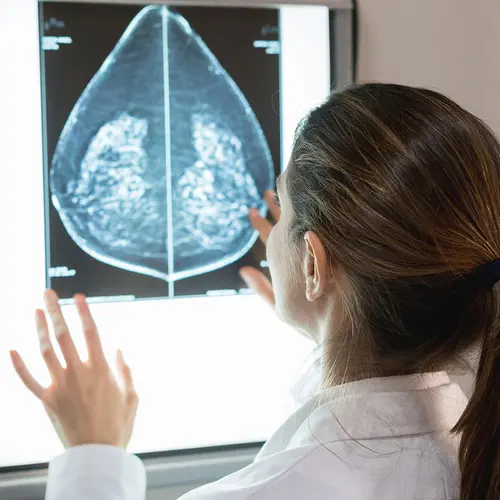Most people with breast cancer get more than one type of treatment, depending on the kind of breast cancer they have and how far it has spread. Certain types of breast cancer, like triple-negative breast cancer (TNBC), are especially challenging to treat. But researchers are optimistic about the latest developments for hard-to-treat breast cancer.
What Makes Breast Cancer Hard to Treat?
The most successful treatments control the way breast cancer cells grow. Breast cancer is divided into three subtypes based on how cells respond to these types of treatment:
- Hormone receptor (HR) positive cancer has the estrogen receptor (ER) and/or progesterone receptor (PR) and responds to hormone therapies.
- HER2-positive cancer has high amounts of the HER2/neu protein and is treated with therapies that target HER2 receptors.
- Triple-negative breast cancer does not contain estrogen or progesterone receptors or the HER2 receptor. Between 10-20 percent of all breast cancer cases fall into this subtype.
Treatments that are most effective for other types of breast cancer don’t work for TNBC. Since there are no hormone receptors, hormone therapy isn’t effective. And drugs that target HER2 aren't helpful, either. At the same time, TNBC tends to be more aggressive than other types of breast cancer. By the time it’s diagnosed, the cancer often has spread to other parts of the body. It also differs from patient to patient and can even change over time to resist certain drugs.
What Role Do Genetic Mutations Play?
One way to find and treat TNBC earlier is to identify those at greater risk of getting breast cancer. To do this, researchers are studying the inherited gene mutations (or variants) that can increase a woman’s risk of getting breast cancer.
Inheriting variants of two genes -- breast cancer gene 1 (BRCA1) and breast cancer gene 2 (BRCA2) -- increases your chance of getting breast and ovarian cancers and certain other types of cancer. If you have one of these variants and do get breast cancer, you’re more likely to get it at a younger age.
Learning more about the other genetic variants linked to breast cancer may lead to better treatment of TNBC. Most breast cancers with the BRCA1 mutation are triple-negative, but other genes can also be targeted for treatment in TNBC. Studies show that some drug therapies may be more effective in treating BRCA-related and other genetic variants in breast cancers.
Some doctors recommend that everyone with TNBC be tested for gene mutations linked to breast cancer, including BRCA1 and BRCA2. If you were diagnosed with TNBC at 60 or younger, or if you have a relative with TNBC, your doctor may recommend genetic testing. Knowing your status may be helpful to you both when it comes to selecting effective therapies. For example, TNBC patients with certain variants may be more likely to respond to some treatments.
What About Late-Stage (Metastatic) Breast Cancer?
Another type of breast cancer that’s hard to treat is metastatic breast cancer -- cancer that has spread to a new area of the body, such as the bones, brain, liver, or lungs. Some cancers are diagnosed at this late stage, but more often it’s diagnosed after an initial round of treatment -- sometimes even years after your initial diagnosis.
You can’t do anything to prevent breast cancer from spreading. But once it does, the goal of treatment is to keep the cancer under control. Systemic therapy, which treats the entire body, is the treatment of choice in most instances. Your doctor will base treatment on your specific symptoms, treatment history, where it’s spread, and on the cancer cells themselves.
What Are the Latest Treatments?
Treatments for hard-to-treat breast cancers such as TNBC, metastatic, and recurrent breast cancer have expanded in recent years. This includes chemotherapy -- the mainstay treatment -- which doctors may recommend in combination with different drugs and also to early-stage TNBC individuals before surgery.
Other newer treatment options include:
Drugs such as olaparib (Lynparza) and talazoparib (Talzenna) destroy breast cancer cell DNA in people with BRCA variants and those with HER2-negative and metastatic cancer. They also show promise in treating early-stage TNBC.
Immunotherapy drugs activate the body’s immune system to help destroy the cancer. They’re typically used in combination with chemotherapy and are approved for certain metastatic cancers. Pembrolizumab (Keytruda) is an immunotherapy drug approved for specific types of metastatic or recurrent TNBC that target PDL-1 and early-stage TNBC.
Antibody-drug conjugates (ADCs)
In these drugs, antibodies act like guidance systems, attaching to other drugs in order to help them destroy cancer cells without damaging healthy cells. The ADC drug sacituzumab govitecan (Trodelvy) is approved for metastatic TNBC. Trastuzumab deruxtecan (Enhertu) can be effective in controlling HER2-positive metastatic breast cancer.
Add-on therapies
Several newer drugs approved for advanced or metastatic HR-positive breast cancer work in combination with hormone therapies. One, abemaciclib (Verzenio), is used after hormone therapy in those with certain advanced or metastatic cancers.
What Does the Future Hold?
Researchers are investigating modified versions of existing therapies to expand the treatment options. This includes exploring new immunotherapy combinations and figuring out which signs can predict outcomes. They’re also studying treatments approved for other uses, such as the chemotherapy drug decitabine, which may be effective in treating TNBC.
Other treatments with potential include expanded use of PARP inhibitors and targeting androgen (the main male hormone) receptors in TNBC. Some research is even focused on using tissue-friendly nanoparticles to deliver the hormone-therapy drug Herceptin to destroy drug-resistant breast cancer cells.

